Plastic Collective Australia: Sustainability Issues and Strategies
VerifiedAdded on 2022/11/11
|13
|2448
|439
Report
AI Summary
This report provides a sustainability analysis of Plastic Collective Australia, a non-profit organization focused on waste management and environmental protection. The report begins with an executive summary, followed by an overview of the company's background, sustainability-related issues, and strategies. The analysis delves into the roles of planning, organizing, leading, and control within the organization. It highlights challenges such as the high cost of recycling methodologies and the massive waste production in Australia. The report then offers recommendations, including developing resources for waste handling, engaging communities, and building a strong communication framework. The conclusion emphasizes the importance of collaboration, modern technologies, and community engagement to improve the sustainability of Plastic Collective Australia's operations. The report also includes a comprehensive list of references.
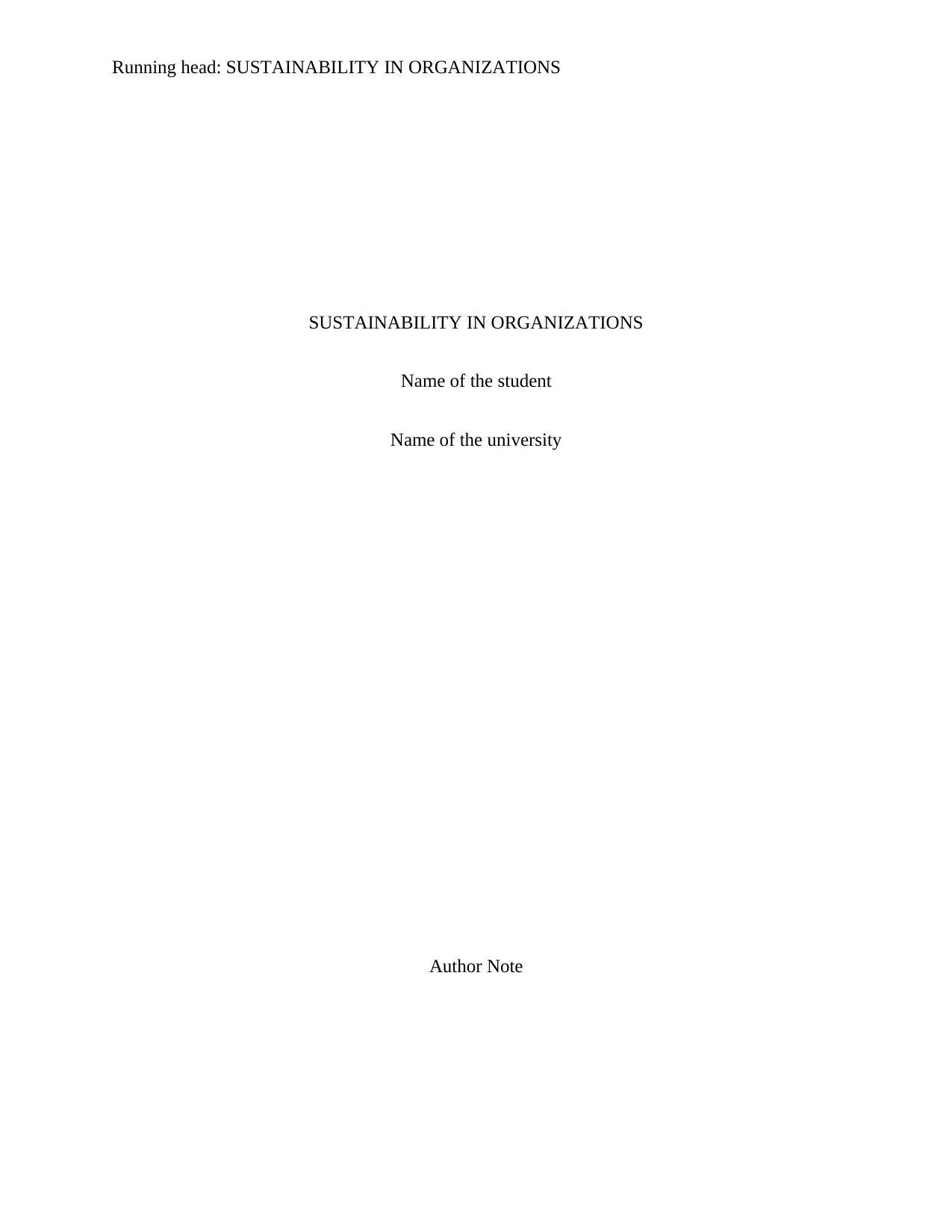
Running head: SUSTAINABILITY IN ORGANIZATIONS
SUSTAINABILITY IN ORGANIZATIONS
Name of the student
Name of the university
Author Note
SUSTAINABILITY IN ORGANIZATIONS
Name of the student
Name of the university
Author Note
Paraphrase This Document
Need a fresh take? Get an instant paraphrase of this document with our AI Paraphraser
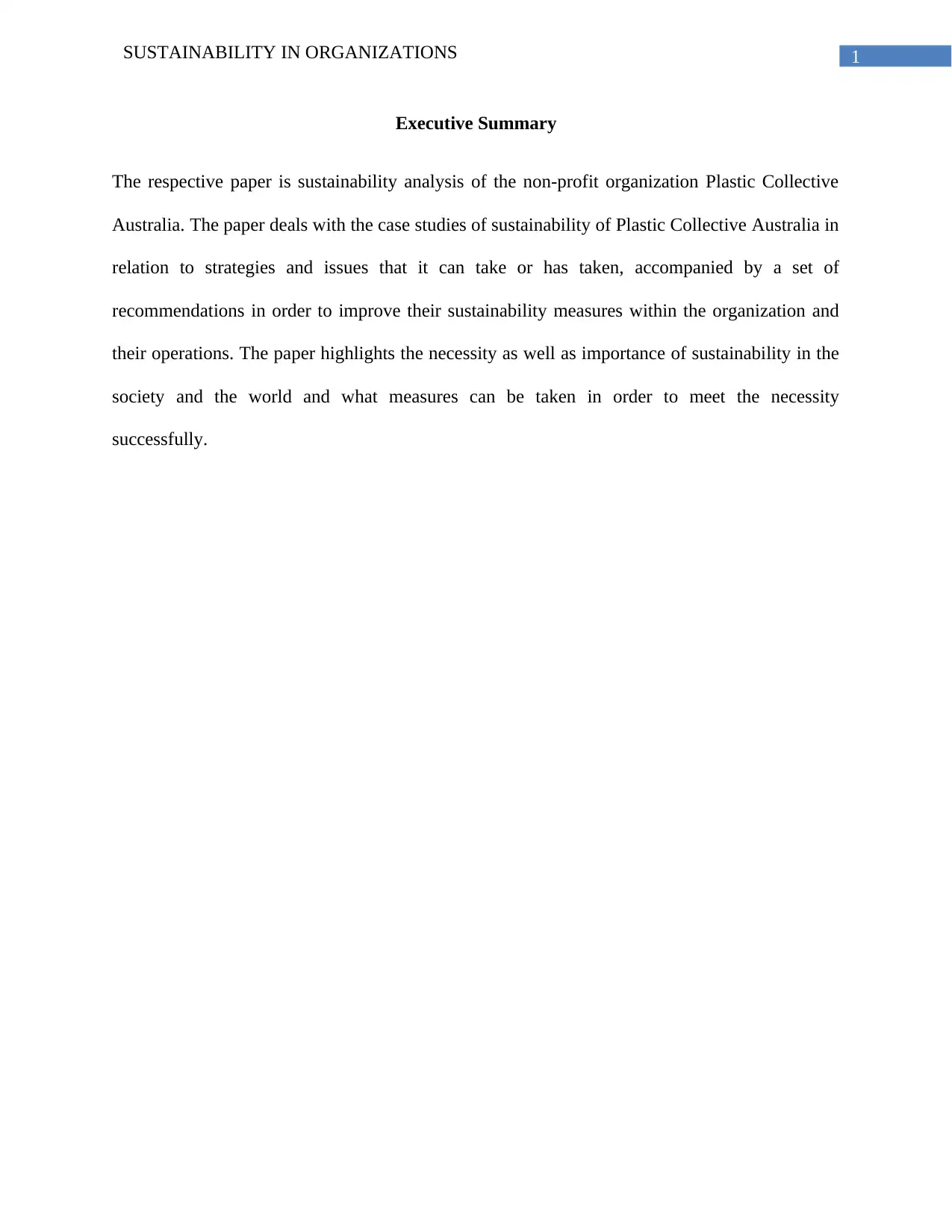
1SUSTAINABILITY IN ORGANIZATIONS
Executive Summary
The respective paper is sustainability analysis of the non-profit organization Plastic Collective
Australia. The paper deals with the case studies of sustainability of Plastic Collective Australia in
relation to strategies and issues that it can take or has taken, accompanied by a set of
recommendations in order to improve their sustainability measures within the organization and
their operations. The paper highlights the necessity as well as importance of sustainability in the
society and the world and what measures can be taken in order to meet the necessity
successfully.
Executive Summary
The respective paper is sustainability analysis of the non-profit organization Plastic Collective
Australia. The paper deals with the case studies of sustainability of Plastic Collective Australia in
relation to strategies and issues that it can take or has taken, accompanied by a set of
recommendations in order to improve their sustainability measures within the organization and
their operations. The paper highlights the necessity as well as importance of sustainability in the
society and the world and what measures can be taken in order to meet the necessity
successfully.
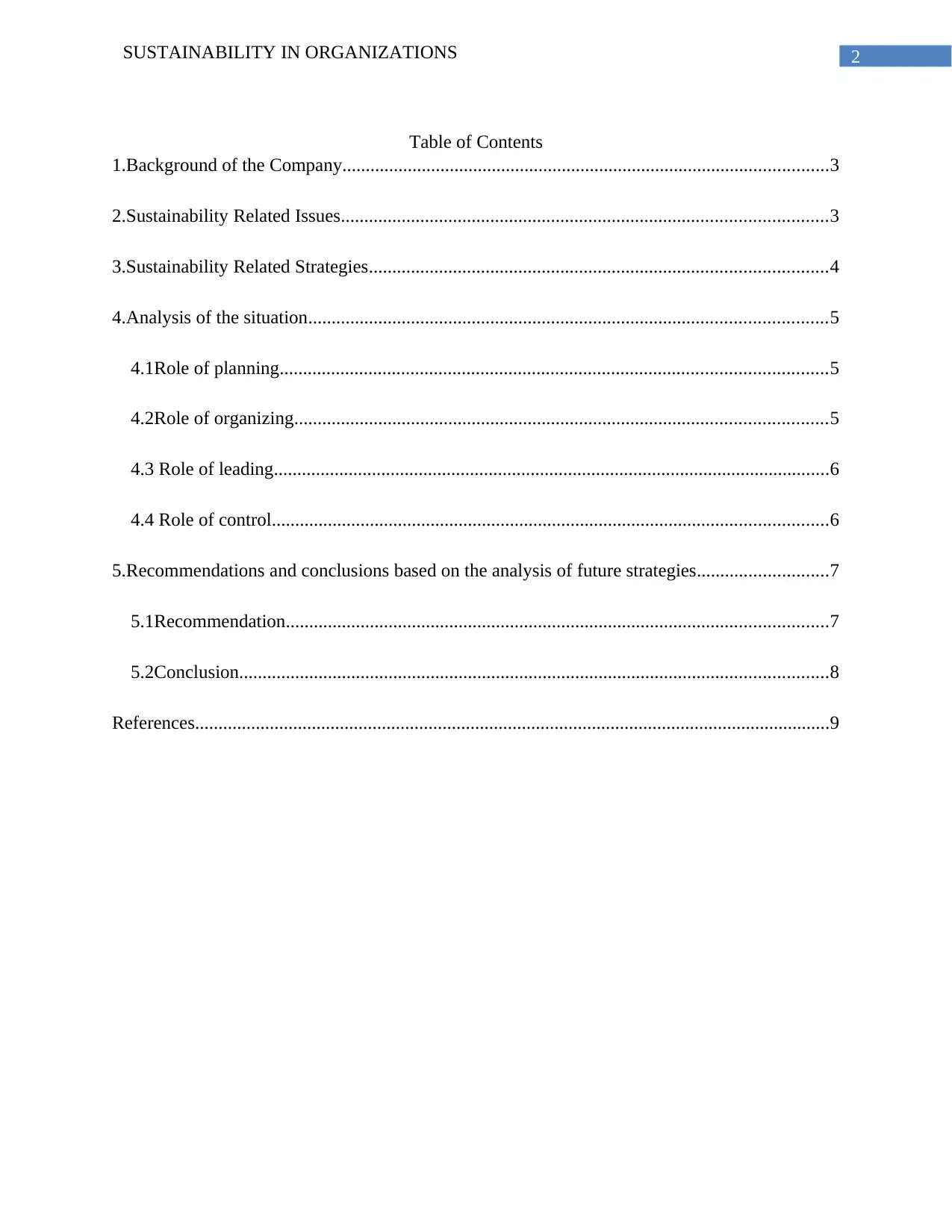
2SUSTAINABILITY IN ORGANIZATIONS
Table of Contents
1.Background of the Company........................................................................................................3
2.Sustainability Related Issues........................................................................................................3
3.Sustainability Related Strategies..................................................................................................4
4.Analysis of the situation...............................................................................................................5
4.1Role of planning.....................................................................................................................5
4.2Role of organizing..................................................................................................................5
4.3 Role of leading.......................................................................................................................6
4.4 Role of control.......................................................................................................................6
5.Recommendations and conclusions based on the analysis of future strategies............................7
5.1Recommendation....................................................................................................................7
5.2Conclusion..............................................................................................................................8
References........................................................................................................................................9
Table of Contents
1.Background of the Company........................................................................................................3
2.Sustainability Related Issues........................................................................................................3
3.Sustainability Related Strategies..................................................................................................4
4.Analysis of the situation...............................................................................................................5
4.1Role of planning.....................................................................................................................5
4.2Role of organizing..................................................................................................................5
4.3 Role of leading.......................................................................................................................6
4.4 Role of control.......................................................................................................................6
5.Recommendations and conclusions based on the analysis of future strategies............................7
5.1Recommendation....................................................................................................................7
5.2Conclusion..............................................................................................................................8
References........................................................................................................................................9
⊘ This is a preview!⊘
Do you want full access?
Subscribe today to unlock all pages.

Trusted by 1+ million students worldwide
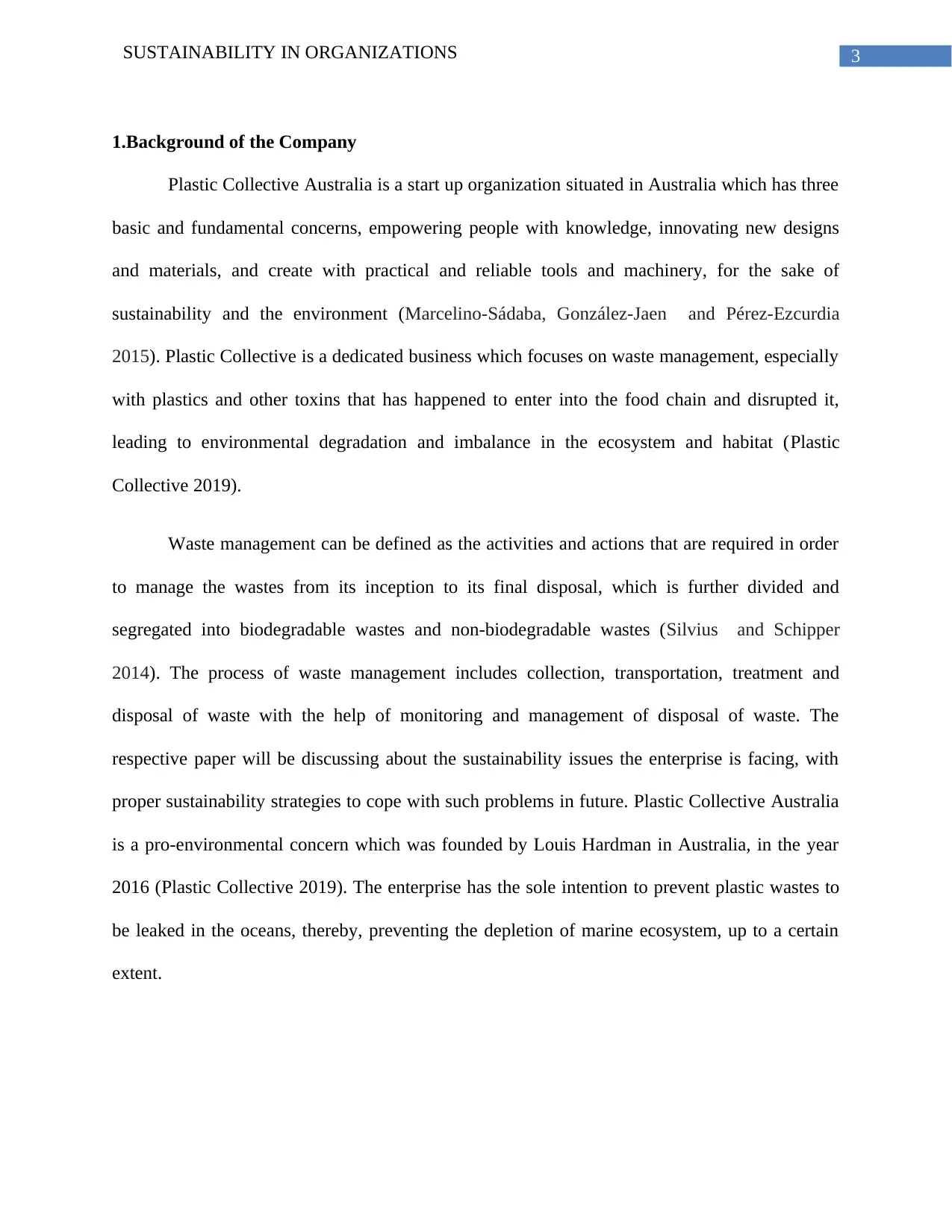
3SUSTAINABILITY IN ORGANIZATIONS
1.Background of the Company
Plastic Collective Australia is a start up organization situated in Australia which has three
basic and fundamental concerns, empowering people with knowledge, innovating new designs
and materials, and create with practical and reliable tools and machinery, for the sake of
sustainability and the environment (Marcelino-Sádaba, González-Jaen and Pérez-Ezcurdia
2015). Plastic Collective is a dedicated business which focuses on waste management, especially
with plastics and other toxins that has happened to enter into the food chain and disrupted it,
leading to environmental degradation and imbalance in the ecosystem and habitat (Plastic
Collective 2019).
Waste management can be defined as the activities and actions that are required in order
to manage the wastes from its inception to its final disposal, which is further divided and
segregated into biodegradable wastes and non-biodegradable wastes (Silvius and Schipper
2014). The process of waste management includes collection, transportation, treatment and
disposal of waste with the help of monitoring and management of disposal of waste. The
respective paper will be discussing about the sustainability issues the enterprise is facing, with
proper sustainability strategies to cope with such problems in future. Plastic Collective Australia
is a pro-environmental concern which was founded by Louis Hardman in Australia, in the year
2016 (Plastic Collective 2019). The enterprise has the sole intention to prevent plastic wastes to
be leaked in the oceans, thereby, preventing the depletion of marine ecosystem, up to a certain
extent.
1.Background of the Company
Plastic Collective Australia is a start up organization situated in Australia which has three
basic and fundamental concerns, empowering people with knowledge, innovating new designs
and materials, and create with practical and reliable tools and machinery, for the sake of
sustainability and the environment (Marcelino-Sádaba, González-Jaen and Pérez-Ezcurdia
2015). Plastic Collective is a dedicated business which focuses on waste management, especially
with plastics and other toxins that has happened to enter into the food chain and disrupted it,
leading to environmental degradation and imbalance in the ecosystem and habitat (Plastic
Collective 2019).
Waste management can be defined as the activities and actions that are required in order
to manage the wastes from its inception to its final disposal, which is further divided and
segregated into biodegradable wastes and non-biodegradable wastes (Silvius and Schipper
2014). The process of waste management includes collection, transportation, treatment and
disposal of waste with the help of monitoring and management of disposal of waste. The
respective paper will be discussing about the sustainability issues the enterprise is facing, with
proper sustainability strategies to cope with such problems in future. Plastic Collective Australia
is a pro-environmental concern which was founded by Louis Hardman in Australia, in the year
2016 (Plastic Collective 2019). The enterprise has the sole intention to prevent plastic wastes to
be leaked in the oceans, thereby, preventing the depletion of marine ecosystem, up to a certain
extent.
Paraphrase This Document
Need a fresh take? Get an instant paraphrase of this document with our AI Paraphraser
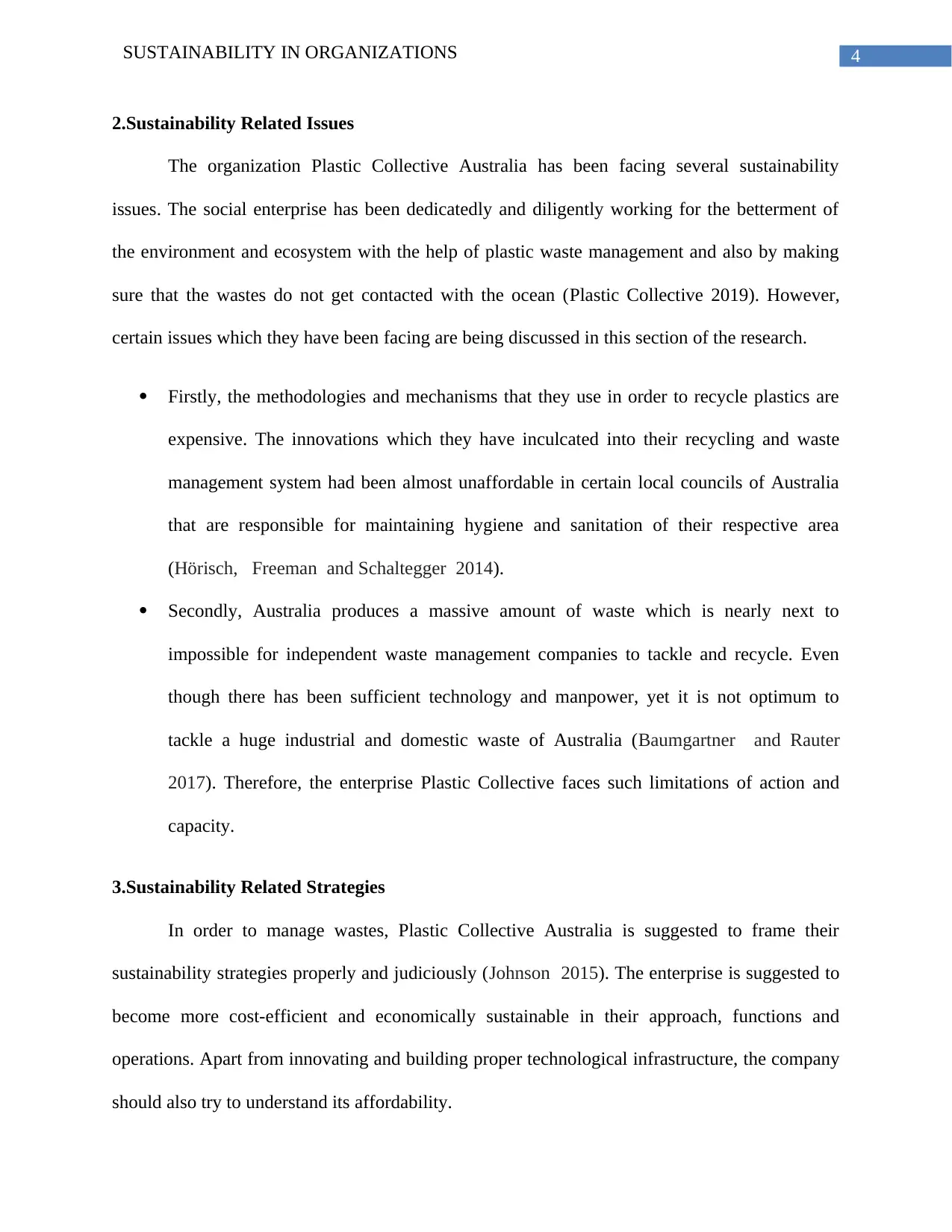
4SUSTAINABILITY IN ORGANIZATIONS
2.Sustainability Related Issues
The organization Plastic Collective Australia has been facing several sustainability
issues. The social enterprise has been dedicatedly and diligently working for the betterment of
the environment and ecosystem with the help of plastic waste management and also by making
sure that the wastes do not get contacted with the ocean (Plastic Collective 2019). However,
certain issues which they have been facing are being discussed in this section of the research.
Firstly, the methodologies and mechanisms that they use in order to recycle plastics are
expensive. The innovations which they have inculcated into their recycling and waste
management system had been almost unaffordable in certain local councils of Australia
that are responsible for maintaining hygiene and sanitation of their respective area
(Hörisch, Freeman and Schaltegger 2014).
Secondly, Australia produces a massive amount of waste which is nearly next to
impossible for independent waste management companies to tackle and recycle. Even
though there has been sufficient technology and manpower, yet it is not optimum to
tackle a huge industrial and domestic waste of Australia (Baumgartner and Rauter
2017). Therefore, the enterprise Plastic Collective faces such limitations of action and
capacity.
3.Sustainability Related Strategies
In order to manage wastes, Plastic Collective Australia is suggested to frame their
sustainability strategies properly and judiciously (Johnson 2015). The enterprise is suggested to
become more cost-efficient and economically sustainable in their approach, functions and
operations. Apart from innovating and building proper technological infrastructure, the company
should also try to understand its affordability.
2.Sustainability Related Issues
The organization Plastic Collective Australia has been facing several sustainability
issues. The social enterprise has been dedicatedly and diligently working for the betterment of
the environment and ecosystem with the help of plastic waste management and also by making
sure that the wastes do not get contacted with the ocean (Plastic Collective 2019). However,
certain issues which they have been facing are being discussed in this section of the research.
Firstly, the methodologies and mechanisms that they use in order to recycle plastics are
expensive. The innovations which they have inculcated into their recycling and waste
management system had been almost unaffordable in certain local councils of Australia
that are responsible for maintaining hygiene and sanitation of their respective area
(Hörisch, Freeman and Schaltegger 2014).
Secondly, Australia produces a massive amount of waste which is nearly next to
impossible for independent waste management companies to tackle and recycle. Even
though there has been sufficient technology and manpower, yet it is not optimum to
tackle a huge industrial and domestic waste of Australia (Baumgartner and Rauter
2017). Therefore, the enterprise Plastic Collective faces such limitations of action and
capacity.
3.Sustainability Related Strategies
In order to manage wastes, Plastic Collective Australia is suggested to frame their
sustainability strategies properly and judiciously (Johnson 2015). The enterprise is suggested to
become more cost-efficient and economically sustainable in their approach, functions and
operations. Apart from innovating and building proper technological infrastructure, the company
should also try to understand its affordability.
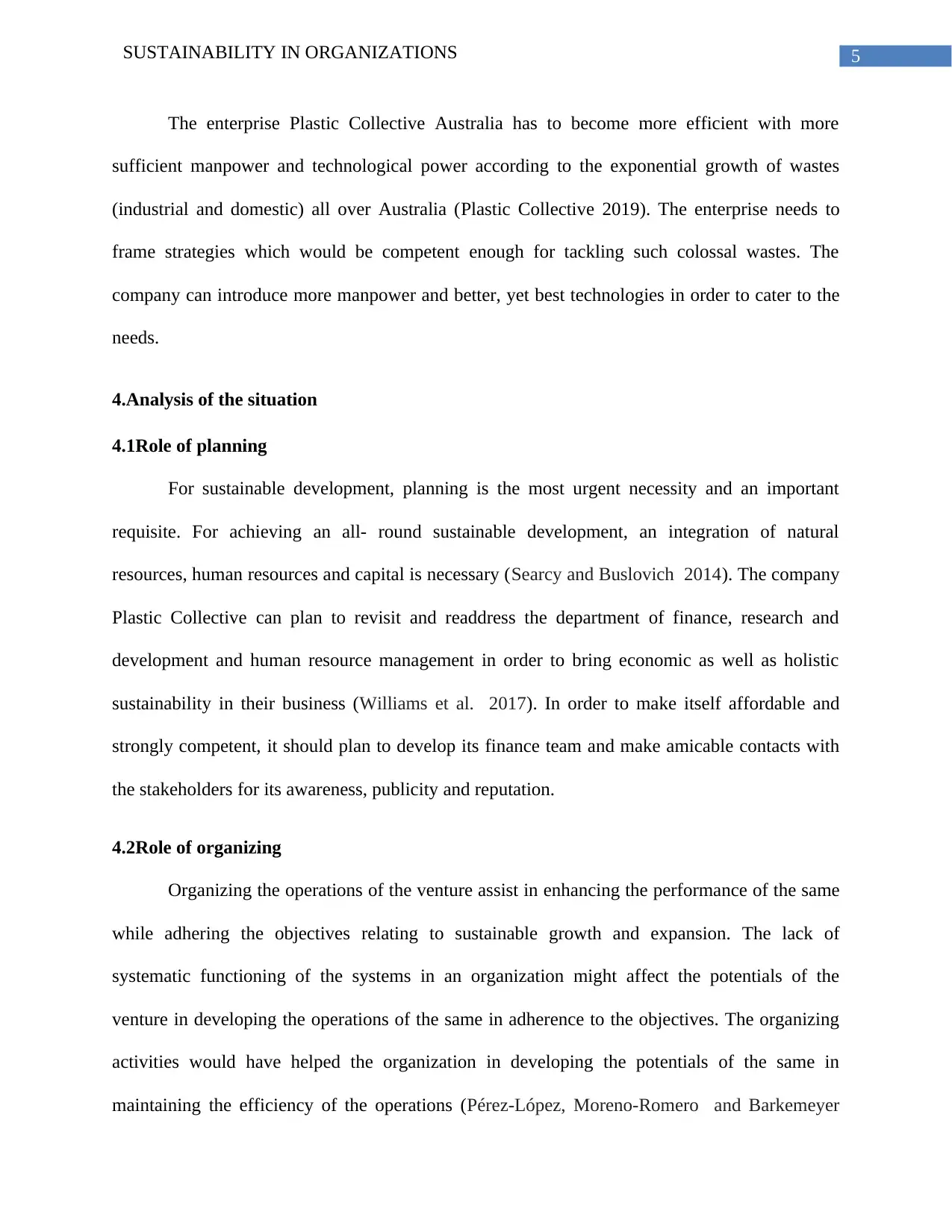
5SUSTAINABILITY IN ORGANIZATIONS
The enterprise Plastic Collective Australia has to become more efficient with more
sufficient manpower and technological power according to the exponential growth of wastes
(industrial and domestic) all over Australia (Plastic Collective 2019). The enterprise needs to
frame strategies which would be competent enough for tackling such colossal wastes. The
company can introduce more manpower and better, yet best technologies in order to cater to the
needs.
4.Analysis of the situation
4.1Role of planning
For sustainable development, planning is the most urgent necessity and an important
requisite. For achieving an all- round sustainable development, an integration of natural
resources, human resources and capital is necessary (Searcy and Buslovich 2014). The company
Plastic Collective can plan to revisit and readdress the department of finance, research and
development and human resource management in order to bring economic as well as holistic
sustainability in their business (Williams et al. 2017). In order to make itself affordable and
strongly competent, it should plan to develop its finance team and make amicable contacts with
the stakeholders for its awareness, publicity and reputation.
4.2Role of organizing
Organizing the operations of the venture assist in enhancing the performance of the same
while adhering the objectives relating to sustainable growth and expansion. The lack of
systematic functioning of the systems in an organization might affect the potentials of the
venture in developing the operations of the same in adherence to the objectives. The organizing
activities would have helped the organization in developing the potentials of the same in
maintaining the efficiency of the operations (Pérez‐López, Moreno‐Romero and Barkemeyer
The enterprise Plastic Collective Australia has to become more efficient with more
sufficient manpower and technological power according to the exponential growth of wastes
(industrial and domestic) all over Australia (Plastic Collective 2019). The enterprise needs to
frame strategies which would be competent enough for tackling such colossal wastes. The
company can introduce more manpower and better, yet best technologies in order to cater to the
needs.
4.Analysis of the situation
4.1Role of planning
For sustainable development, planning is the most urgent necessity and an important
requisite. For achieving an all- round sustainable development, an integration of natural
resources, human resources and capital is necessary (Searcy and Buslovich 2014). The company
Plastic Collective can plan to revisit and readdress the department of finance, research and
development and human resource management in order to bring economic as well as holistic
sustainability in their business (Williams et al. 2017). In order to make itself affordable and
strongly competent, it should plan to develop its finance team and make amicable contacts with
the stakeholders for its awareness, publicity and reputation.
4.2Role of organizing
Organizing the operations of the venture assist in enhancing the performance of the same
while adhering the objectives relating to sustainable growth and expansion. The lack of
systematic functioning of the systems in an organization might affect the potentials of the
venture in developing the operations of the same in adherence to the objectives. The organizing
activities would have helped the organization in developing the potentials of the same in
maintaining the efficiency of the operations (Pérez‐López, Moreno‐Romero and Barkemeyer
⊘ This is a preview!⊘
Do you want full access?
Subscribe today to unlock all pages.

Trusted by 1+ million students worldwide
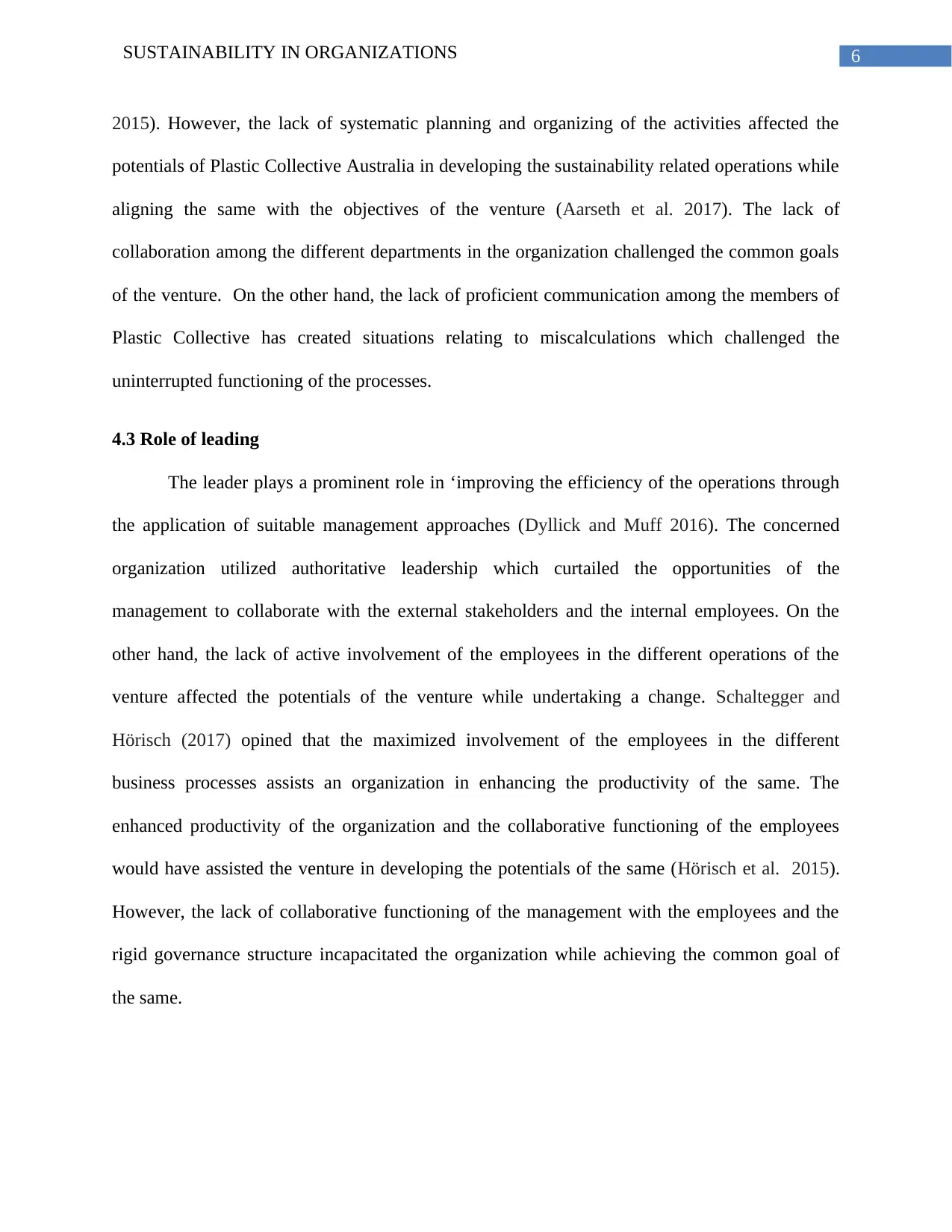
6SUSTAINABILITY IN ORGANIZATIONS
2015). However, the lack of systematic planning and organizing of the activities affected the
potentials of Plastic Collective Australia in developing the sustainability related operations while
aligning the same with the objectives of the venture (Aarseth et al. 2017). The lack of
collaboration among the different departments in the organization challenged the common goals
of the venture. On the other hand, the lack of proficient communication among the members of
Plastic Collective has created situations relating to miscalculations which challenged the
uninterrupted functioning of the processes.
4.3 Role of leading
The leader plays a prominent role in ‘improving the efficiency of the operations through
the application of suitable management approaches (Dyllick and Muff 2016). The concerned
organization utilized authoritative leadership which curtailed the opportunities of the
management to collaborate with the external stakeholders and the internal employees. On the
other hand, the lack of active involvement of the employees in the different operations of the
venture affected the potentials of the venture while undertaking a change. Schaltegger and
Hörisch (2017) opined that the maximized involvement of the employees in the different
business processes assists an organization in enhancing the productivity of the same. The
enhanced productivity of the organization and the collaborative functioning of the employees
would have assisted the venture in developing the potentials of the same (Hörisch et al. 2015).
However, the lack of collaborative functioning of the management with the employees and the
rigid governance structure incapacitated the organization while achieving the common goal of
the same.
2015). However, the lack of systematic planning and organizing of the activities affected the
potentials of Plastic Collective Australia in developing the sustainability related operations while
aligning the same with the objectives of the venture (Aarseth et al. 2017). The lack of
collaboration among the different departments in the organization challenged the common goals
of the venture. On the other hand, the lack of proficient communication among the members of
Plastic Collective has created situations relating to miscalculations which challenged the
uninterrupted functioning of the processes.
4.3 Role of leading
The leader plays a prominent role in ‘improving the efficiency of the operations through
the application of suitable management approaches (Dyllick and Muff 2016). The concerned
organization utilized authoritative leadership which curtailed the opportunities of the
management to collaborate with the external stakeholders and the internal employees. On the
other hand, the lack of active involvement of the employees in the different operations of the
venture affected the potentials of the venture while undertaking a change. Schaltegger and
Hörisch (2017) opined that the maximized involvement of the employees in the different
business processes assists an organization in enhancing the productivity of the same. The
enhanced productivity of the organization and the collaborative functioning of the employees
would have assisted the venture in developing the potentials of the same (Hörisch et al. 2015).
However, the lack of collaborative functioning of the management with the employees and the
rigid governance structure incapacitated the organization while achieving the common goal of
the same.
Paraphrase This Document
Need a fresh take? Get an instant paraphrase of this document with our AI Paraphraser
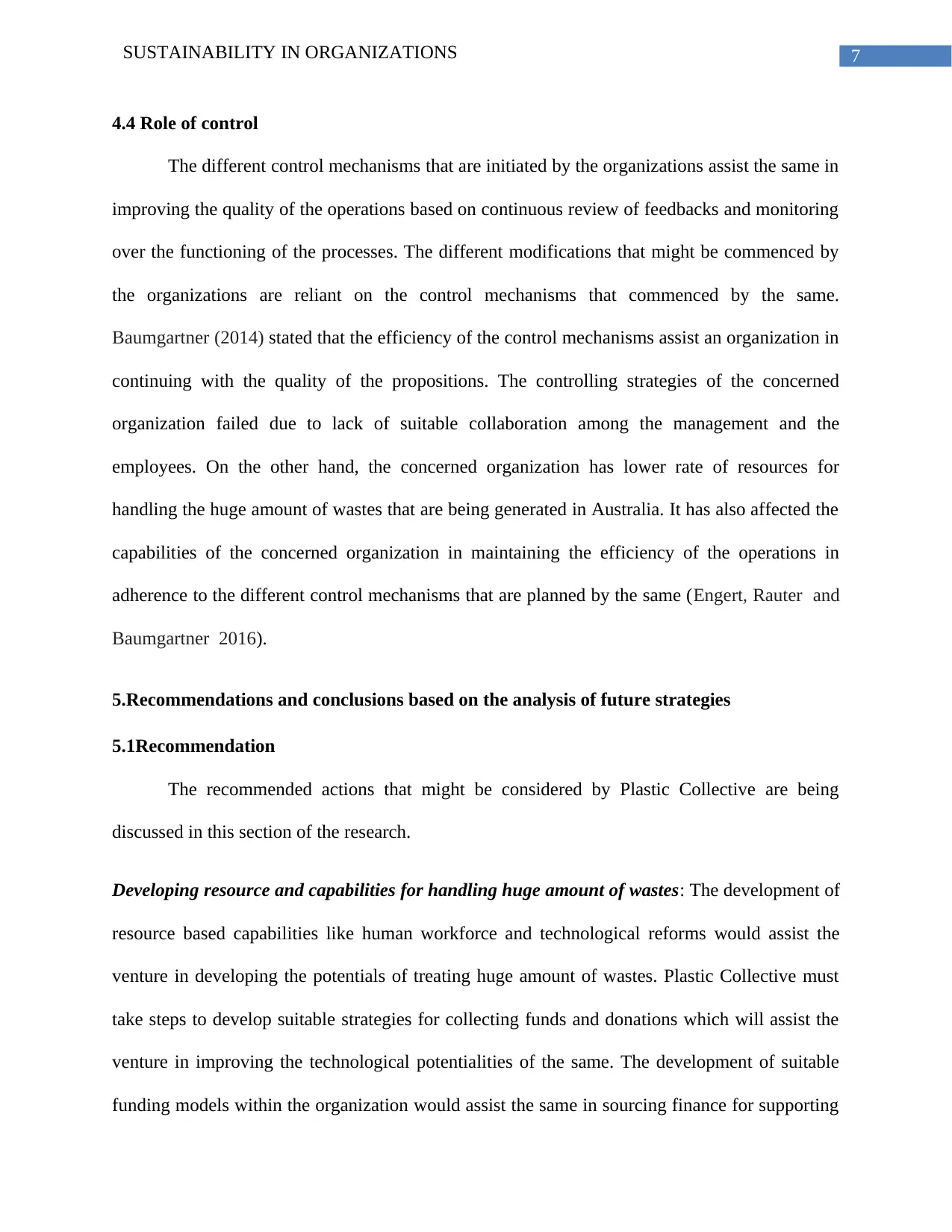
7SUSTAINABILITY IN ORGANIZATIONS
4.4 Role of control
The different control mechanisms that are initiated by the organizations assist the same in
improving the quality of the operations based on continuous review of feedbacks and monitoring
over the functioning of the processes. The different modifications that might be commenced by
the organizations are reliant on the control mechanisms that commenced by the same.
Baumgartner (2014) stated that the efficiency of the control mechanisms assist an organization in
continuing with the quality of the propositions. The controlling strategies of the concerned
organization failed due to lack of suitable collaboration among the management and the
employees. On the other hand, the concerned organization has lower rate of resources for
handling the huge amount of wastes that are being generated in Australia. It has also affected the
capabilities of the concerned organization in maintaining the efficiency of the operations in
adherence to the different control mechanisms that are planned by the same (Engert, Rauter and
Baumgartner 2016).
5.Recommendations and conclusions based on the analysis of future strategies
5.1Recommendation
The recommended actions that might be considered by Plastic Collective are being
discussed in this section of the research.
Developing resource and capabilities for handling huge amount of wastes: The development of
resource based capabilities like human workforce and technological reforms would assist the
venture in developing the potentials of treating huge amount of wastes. Plastic Collective must
take steps to develop suitable strategies for collecting funds and donations which will assist the
venture in improving the technological potentialities of the same. The development of suitable
funding models within the organization would assist the same in sourcing finance for supporting
4.4 Role of control
The different control mechanisms that are initiated by the organizations assist the same in
improving the quality of the operations based on continuous review of feedbacks and monitoring
over the functioning of the processes. The different modifications that might be commenced by
the organizations are reliant on the control mechanisms that commenced by the same.
Baumgartner (2014) stated that the efficiency of the control mechanisms assist an organization in
continuing with the quality of the propositions. The controlling strategies of the concerned
organization failed due to lack of suitable collaboration among the management and the
employees. On the other hand, the concerned organization has lower rate of resources for
handling the huge amount of wastes that are being generated in Australia. It has also affected the
capabilities of the concerned organization in maintaining the efficiency of the operations in
adherence to the different control mechanisms that are planned by the same (Engert, Rauter and
Baumgartner 2016).
5.Recommendations and conclusions based on the analysis of future strategies
5.1Recommendation
The recommended actions that might be considered by Plastic Collective are being
discussed in this section of the research.
Developing resource and capabilities for handling huge amount of wastes: The development of
resource based capabilities like human workforce and technological reforms would assist the
venture in developing the potentials of treating huge amount of wastes. Plastic Collective must
take steps to develop suitable strategies for collecting funds and donations which will assist the
venture in improving the technological potentialities of the same. The development of suitable
funding models within the organization would assist the same in sourcing finance for supporting
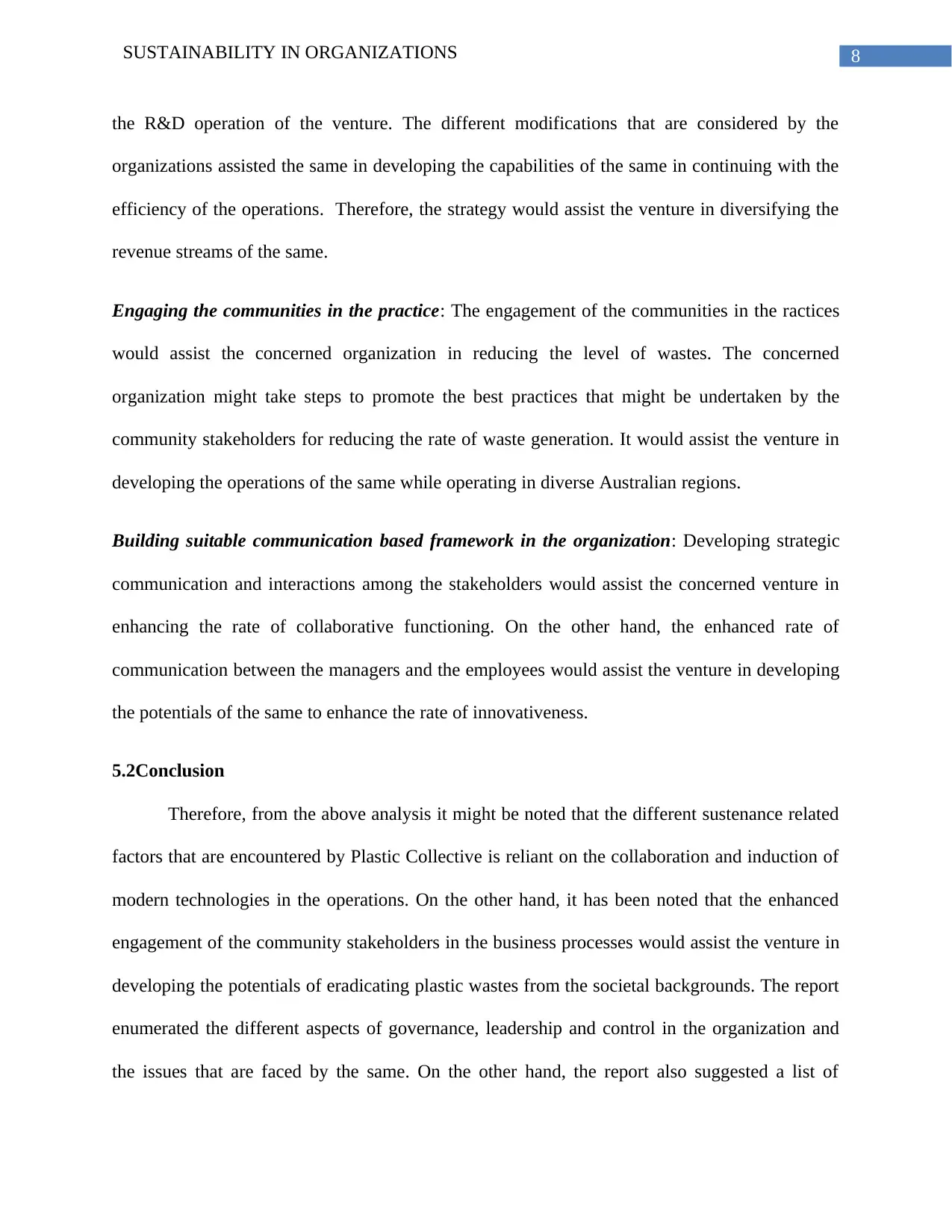
8SUSTAINABILITY IN ORGANIZATIONS
the R&D operation of the venture. The different modifications that are considered by the
organizations assisted the same in developing the capabilities of the same in continuing with the
efficiency of the operations. Therefore, the strategy would assist the venture in diversifying the
revenue streams of the same.
Engaging the communities in the practice: The engagement of the communities in the ractices
would assist the concerned organization in reducing the level of wastes. The concerned
organization might take steps to promote the best practices that might be undertaken by the
community stakeholders for reducing the rate of waste generation. It would assist the venture in
developing the operations of the same while operating in diverse Australian regions.
Building suitable communication based framework in the organization: Developing strategic
communication and interactions among the stakeholders would assist the concerned venture in
enhancing the rate of collaborative functioning. On the other hand, the enhanced rate of
communication between the managers and the employees would assist the venture in developing
the potentials of the same to enhance the rate of innovativeness.
5.2Conclusion
Therefore, from the above analysis it might be noted that the different sustenance related
factors that are encountered by Plastic Collective is reliant on the collaboration and induction of
modern technologies in the operations. On the other hand, it has been noted that the enhanced
engagement of the community stakeholders in the business processes would assist the venture in
developing the potentials of eradicating plastic wastes from the societal backgrounds. The report
enumerated the different aspects of governance, leadership and control in the organization and
the issues that are faced by the same. On the other hand, the report also suggested a list of
the R&D operation of the venture. The different modifications that are considered by the
organizations assisted the same in developing the capabilities of the same in continuing with the
efficiency of the operations. Therefore, the strategy would assist the venture in diversifying the
revenue streams of the same.
Engaging the communities in the practice: The engagement of the communities in the ractices
would assist the concerned organization in reducing the level of wastes. The concerned
organization might take steps to promote the best practices that might be undertaken by the
community stakeholders for reducing the rate of waste generation. It would assist the venture in
developing the operations of the same while operating in diverse Australian regions.
Building suitable communication based framework in the organization: Developing strategic
communication and interactions among the stakeholders would assist the concerned venture in
enhancing the rate of collaborative functioning. On the other hand, the enhanced rate of
communication between the managers and the employees would assist the venture in developing
the potentials of the same to enhance the rate of innovativeness.
5.2Conclusion
Therefore, from the above analysis it might be noted that the different sustenance related
factors that are encountered by Plastic Collective is reliant on the collaboration and induction of
modern technologies in the operations. On the other hand, it has been noted that the enhanced
engagement of the community stakeholders in the business processes would assist the venture in
developing the potentials of eradicating plastic wastes from the societal backgrounds. The report
enumerated the different aspects of governance, leadership and control in the organization and
the issues that are faced by the same. On the other hand, the report also suggested a list of
⊘ This is a preview!⊘
Do you want full access?
Subscribe today to unlock all pages.

Trusted by 1+ million students worldwide
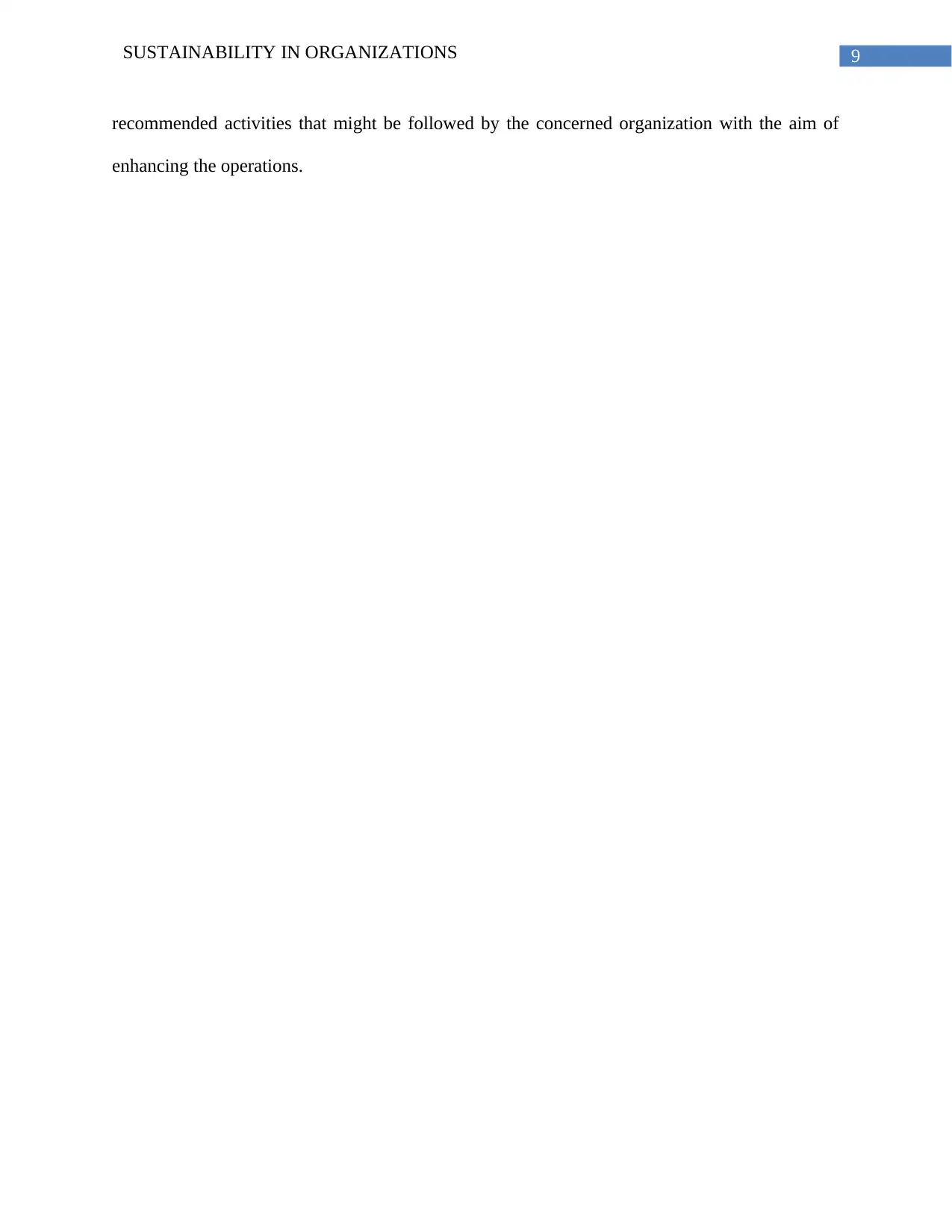
9SUSTAINABILITY IN ORGANIZATIONS
recommended activities that might be followed by the concerned organization with the aim of
enhancing the operations.
recommended activities that might be followed by the concerned organization with the aim of
enhancing the operations.
Paraphrase This Document
Need a fresh take? Get an instant paraphrase of this document with our AI Paraphraser
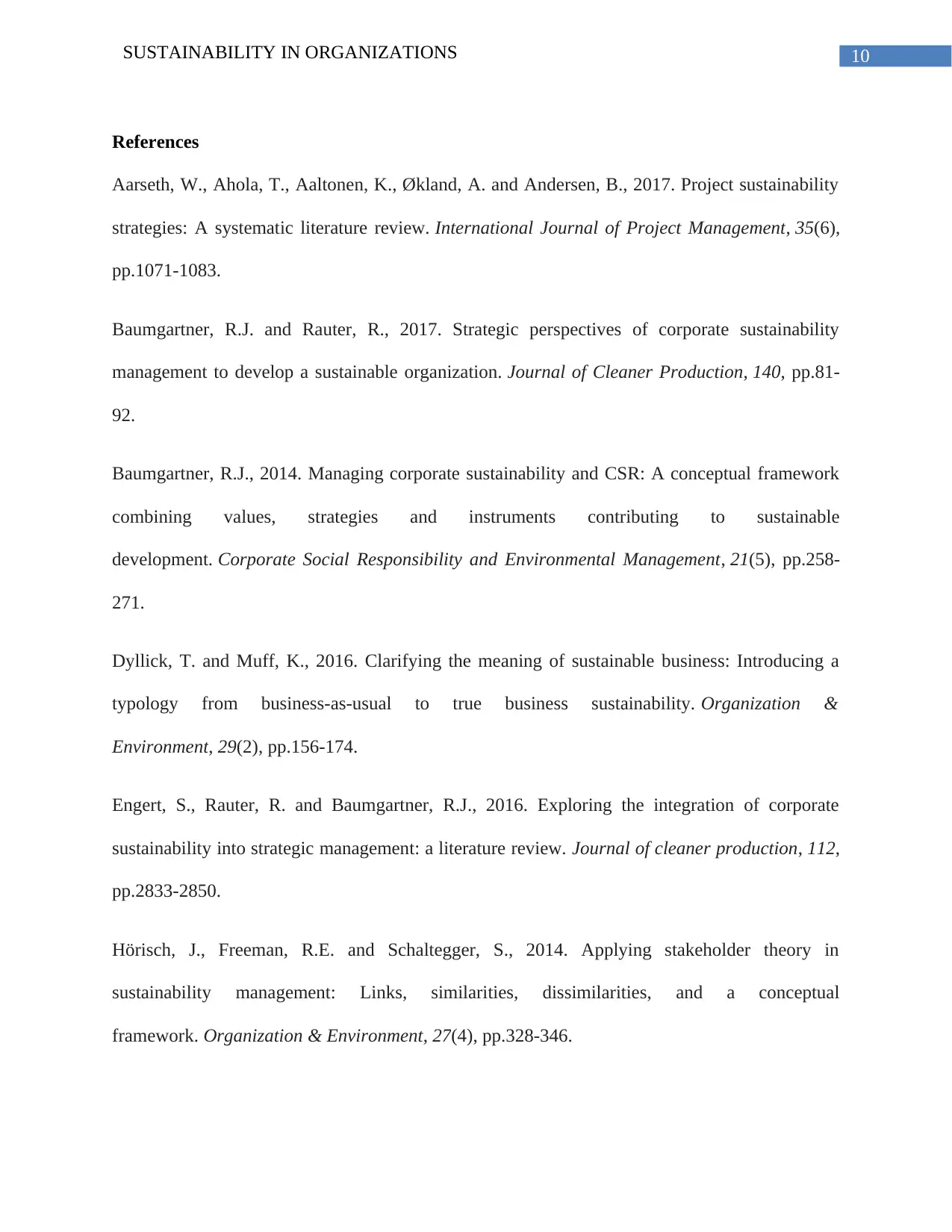
10SUSTAINABILITY IN ORGANIZATIONS
References
Aarseth, W., Ahola, T., Aaltonen, K., Økland, A. and Andersen, B., 2017. Project sustainability
strategies: A systematic literature review. International Journal of Project Management, 35(6),
pp.1071-1083.
Baumgartner, R.J. and Rauter, R., 2017. Strategic perspectives of corporate sustainability
management to develop a sustainable organization. Journal of Cleaner Production, 140, pp.81-
92.
Baumgartner, R.J., 2014. Managing corporate sustainability and CSR: A conceptual framework
combining values, strategies and instruments contributing to sustainable
development. Corporate Social Responsibility and Environmental Management, 21(5), pp.258-
271.
Dyllick, T. and Muff, K., 2016. Clarifying the meaning of sustainable business: Introducing a
typology from business-as-usual to true business sustainability. Organization &
Environment, 29(2), pp.156-174.
Engert, S., Rauter, R. and Baumgartner, R.J., 2016. Exploring the integration of corporate
sustainability into strategic management: a literature review. Journal of cleaner production, 112,
pp.2833-2850.
Hörisch, J., Freeman, R.E. and Schaltegger, S., 2014. Applying stakeholder theory in
sustainability management: Links, similarities, dissimilarities, and a conceptual
framework. Organization & Environment, 27(4), pp.328-346.
References
Aarseth, W., Ahola, T., Aaltonen, K., Økland, A. and Andersen, B., 2017. Project sustainability
strategies: A systematic literature review. International Journal of Project Management, 35(6),
pp.1071-1083.
Baumgartner, R.J. and Rauter, R., 2017. Strategic perspectives of corporate sustainability
management to develop a sustainable organization. Journal of Cleaner Production, 140, pp.81-
92.
Baumgartner, R.J., 2014. Managing corporate sustainability and CSR: A conceptual framework
combining values, strategies and instruments contributing to sustainable
development. Corporate Social Responsibility and Environmental Management, 21(5), pp.258-
271.
Dyllick, T. and Muff, K., 2016. Clarifying the meaning of sustainable business: Introducing a
typology from business-as-usual to true business sustainability. Organization &
Environment, 29(2), pp.156-174.
Engert, S., Rauter, R. and Baumgartner, R.J., 2016. Exploring the integration of corporate
sustainability into strategic management: a literature review. Journal of cleaner production, 112,
pp.2833-2850.
Hörisch, J., Freeman, R.E. and Schaltegger, S., 2014. Applying stakeholder theory in
sustainability management: Links, similarities, dissimilarities, and a conceptual
framework. Organization & Environment, 27(4), pp.328-346.
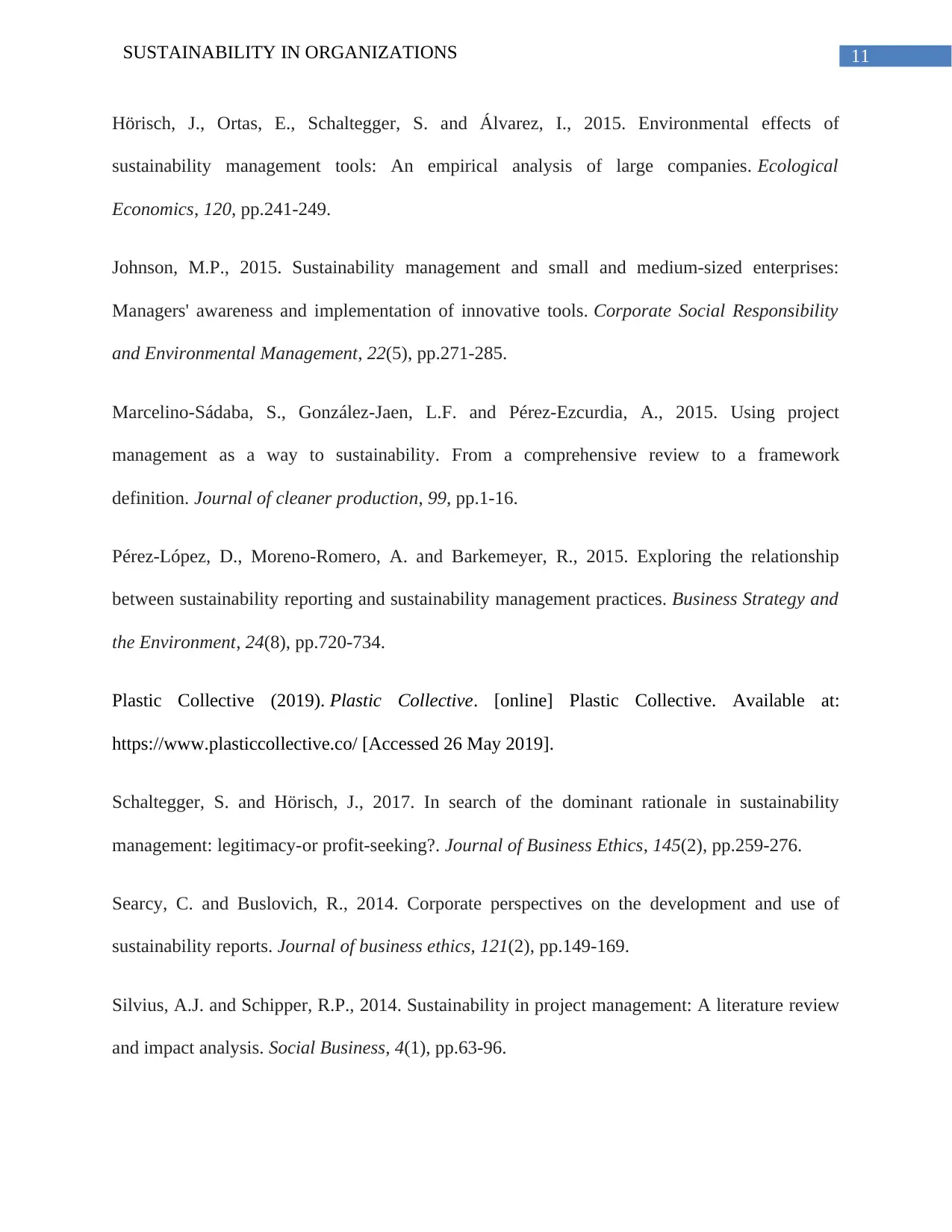
11SUSTAINABILITY IN ORGANIZATIONS
Hörisch, J., Ortas, E., Schaltegger, S. and Álvarez, I., 2015. Environmental effects of
sustainability management tools: An empirical analysis of large companies. Ecological
Economics, 120, pp.241-249.
Johnson, M.P., 2015. Sustainability management and small and medium‐sized enterprises:
Managers' awareness and implementation of innovative tools. Corporate Social Responsibility
and Environmental Management, 22(5), pp.271-285.
Marcelino-Sádaba, S., González-Jaen, L.F. and Pérez-Ezcurdia, A., 2015. Using project
management as a way to sustainability. From a comprehensive review to a framework
definition. Journal of cleaner production, 99, pp.1-16.
Pérez‐López, D., Moreno‐Romero, A. and Barkemeyer, R., 2015. Exploring the relationship
between sustainability reporting and sustainability management practices. Business Strategy and
the Environment, 24(8), pp.720-734.
Plastic Collective (2019). Plastic Collective. [online] Plastic Collective. Available at:
https://www.plasticcollective.co/ [Accessed 26 May 2019].
Schaltegger, S. and Hörisch, J., 2017. In search of the dominant rationale in sustainability
management: legitimacy-or profit-seeking?. Journal of Business Ethics, 145(2), pp.259-276.
Searcy, C. and Buslovich, R., 2014. Corporate perspectives on the development and use of
sustainability reports. Journal of business ethics, 121(2), pp.149-169.
Silvius, A.J. and Schipper, R.P., 2014. Sustainability in project management: A literature review
and impact analysis. Social Business, 4(1), pp.63-96.
Hörisch, J., Ortas, E., Schaltegger, S. and Álvarez, I., 2015. Environmental effects of
sustainability management tools: An empirical analysis of large companies. Ecological
Economics, 120, pp.241-249.
Johnson, M.P., 2015. Sustainability management and small and medium‐sized enterprises:
Managers' awareness and implementation of innovative tools. Corporate Social Responsibility
and Environmental Management, 22(5), pp.271-285.
Marcelino-Sádaba, S., González-Jaen, L.F. and Pérez-Ezcurdia, A., 2015. Using project
management as a way to sustainability. From a comprehensive review to a framework
definition. Journal of cleaner production, 99, pp.1-16.
Pérez‐López, D., Moreno‐Romero, A. and Barkemeyer, R., 2015. Exploring the relationship
between sustainability reporting and sustainability management practices. Business Strategy and
the Environment, 24(8), pp.720-734.
Plastic Collective (2019). Plastic Collective. [online] Plastic Collective. Available at:
https://www.plasticcollective.co/ [Accessed 26 May 2019].
Schaltegger, S. and Hörisch, J., 2017. In search of the dominant rationale in sustainability
management: legitimacy-or profit-seeking?. Journal of Business Ethics, 145(2), pp.259-276.
Searcy, C. and Buslovich, R., 2014. Corporate perspectives on the development and use of
sustainability reports. Journal of business ethics, 121(2), pp.149-169.
Silvius, A.J. and Schipper, R.P., 2014. Sustainability in project management: A literature review
and impact analysis. Social Business, 4(1), pp.63-96.
⊘ This is a preview!⊘
Do you want full access?
Subscribe today to unlock all pages.

Trusted by 1+ million students worldwide
1 out of 13
Related Documents
Your All-in-One AI-Powered Toolkit for Academic Success.
+13062052269
info@desklib.com
Available 24*7 on WhatsApp / Email
![[object Object]](/_next/static/media/star-bottom.7253800d.svg)
Unlock your academic potential
Copyright © 2020–2026 A2Z Services. All Rights Reserved. Developed and managed by ZUCOL.




